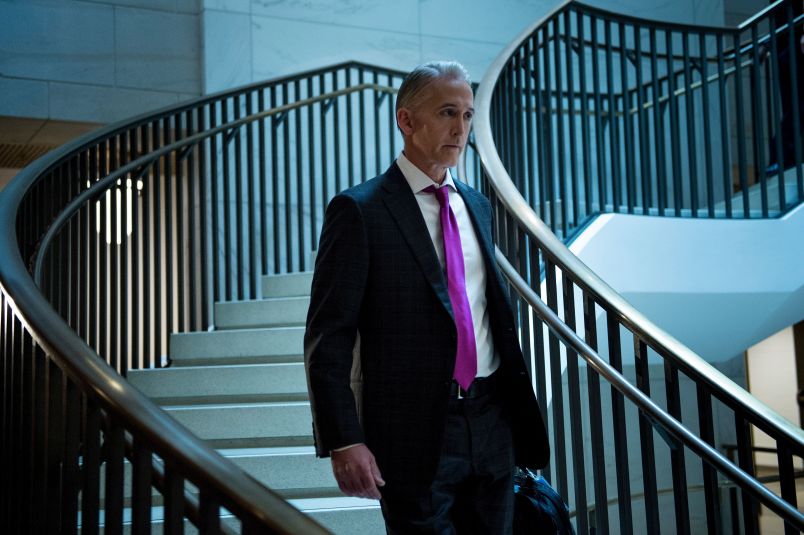Of all the conservative-firebrands-turned-TV-lawyers the Trump administration could have tapped to join its impeachment defense, former South Carolina congressman Trey Gowdy makes the least sense.
In an era when the White House’s only discernible line of defense against a swelling impeachment inquiry is to stonewall Congress’ requests for documents and witness testimony, hiring one of the most ardent boosters of Congress’ authority to check the executive branch sends a perplexing message.
Let’s go back a few years. During his days as head of the House Oversight Committee in 2012, Gowdy led the committee’s vote to hold then-Attorney General Eric Holder in contempt for not turning over some documents relevant to the then-Operation Fast and Furious investigation. The vote came after the Obama administration allowed the attorney general to invoke executive privilege over some of the records.
“The notion that you can withhold information and documents from Congress no matter whether you’re the part in power or not in power is wrong,” he said in 2012, chiding from his seat as House Oversight chairman. “Respect for the rule of law must mean something irrespective of the vicissitudes of political cycles.”
Meanwhile back in 2012 …. pic.twitter.com/bzzifXANOm
— Nicole Lafond (@Nicole_Lafond) October 9, 2019
Sounds familiar today, doesn’t it? Twitter and cable news outlets alike have resurfaced the clip in the past 24 hours to critique Gowdy for taking the new gig.
Several news outlets have reported that Gowdy has been offered the job and accepted, but New York Times reporter Maggie Haberman reported Tuesday evening that he hadn’t quite been officially offered the role. Either way, he’s meeting with the White House to discuss it. MSNBC reported that Gowdy was initially hesitant to take up the task.
While the 2012 video may be the most glaring example of the selective memory surrounding Gowdy’s decision to join team Trump, Gowdy expressed similar outrage while in the thick of what would culminate as a dud, two-year-long probe into former Secretary of State Hillary Clinton and the attacks at an American diplomatic post in Benghazi, Libya.
While leading the House Select Committee on Benghazi back in 2015, Gowdy defended his committee’s expansive scope in the investigation and called out the State Department for what he perceived to be slow-rolling the release of documents relevant to the investigation.
“The operative word in the resolution is the word ‘all.’ And the word ‘all’ is about as comprehensive word as you can use,” he said. “So it stands to reason if you’re asked to conduct a full and complete investigation into all policies, decisions and activities, you need access to all witnesses and all relevant documents.”
Also: here's Gowdy in 2015 defending the scope of the Benghazi probe, a notable point given conservatives' repeated attacks on the scope of Mueller's investigationhttps://t.co/h5NGgSov0f
— Nicole Lafond (@Nicole_Lafond) October 9, 2019
Gowdy has made more subtle statements in the past that make his appointment to Trump impeachment defense team an odd fit.
Gowdy has remained an ardent supporter of the Justice Department and the FBI, most notably attracting furor from Trump loyalists when he bucked the “spygate” rhetoric and declared the FBI was acting appropriately when it assigned an informant to contact members of the Trump campaign who were believed to have ties to Russia. While Gowdy came to this conclusion after attending a Trump-mandated classified briefing, he was still broadly chastised for the remark, including by Trump’s personal attorney Rudy Giuliani. At the time the former New York City mayor scoffed at the characterization and called Gowdy “uniformed.”
That coupled with Gowdy’s full-throated support of the FBI, Justice Department and special counsel Robert Mueller throughout the Russian election interference investigation — instead of embracing the “deep state” theories peddled by his colleagues — make the former lawmaker’s decision to join the Trump legal team further perplexing.
Gowdy’s never been particularly nice to the President either, nor vice-versa. In March 2018, Gowdy strikingly called out then-Trump lawyer John Dowd for failing to advise restraint in Trump’s attacks on Mueller.
“If you have an innocent client, Mr. Dowd, act like it,” Gowdy said.
Trump has also returned the favor, regularly tweeting to blame Gowdy for failing to bring down Hillary Clinton in his committee’s Benghazi investigation. To be fair, Gowdy has also acknowledged he feels like a “loser” for the results of that probe.
Upon announcing his retirement early last year, Gowdy said he would make a swift return to the justice system, arguing “whatever skills I may have are better utilized in a courtroom than in Congress.” In interviews following his announcement, Gowdy decried the political gamesmanship required to be an effective lawmaker and lamented how little he was able to accomplish because of the politics in Congress.
So why did he take up a gig that will put him front-and-center in one of the most partisan Beltway battles imaginable?



